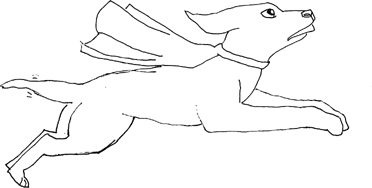
6
RARELY DID DAD ARRIVE AFTER DARK; ALMOST NEVER DID he not call to check in two or more times before he made it back. But on Monday night, I didn’t hear from him.
I checked the schedule. Dad home 6ish. It was six thirty. There were no notices on the wall calendar—no invites or special events hanging from Superman’s magnetic cape, or Spider-Man’s sticky web, so I sat by the window with Harry to look out for him during commercial breaks. I checked the kitchen clock, over and over again, because I didn’t have a watch. They’d all gone missing—washing mishaps, strap malfunctions, scrapes—so I was always late, but now he was, too. Seven, and then seven thirty, and where was he? When was I going to eat? Was I even hungry? It was hard to tell.
I scanned the television for alerts of accidents on the tracks or holdups on the trains, unexpected weather patterns. There was no news.
When I returned to the window, I saw there was no traffic either. So I watched Nugget, my favorite neighbor. He was sitting in the last strip of sun on his porch, taking in the dusky breeze. I knew that if I could concentrate on the folds in his fur and the half-shut eyes, I could channel all of my energy away from Dad. My most powerful distraction: a sketchbook and an animal, a connection no television show could compete with.
I opened a blank page for Nugget and imagined him as an all-powerful retriever, the kind who could fetch people as well as bones, who could sniff out bodies from the rubble and run to the city to bring home lost fathers. I began to draw with supreme concentration, images of a new kind of superdog filling my head, and my hand, and my canvas. The Yellow Redeemer was born.

Just as I began the process of shading, the phone rang.
“Dad?”
It was Nate. He had just finished his junior year at Columbia. He only called on birthdays and special occasions.
“Did you want to talk to Dad? He’s not here.”
“I know,” he said.
“How do you know?” I knew something was wrong. I could feel it in the tingly vibration beneath my skin.
“Are you with him?”
“I’m not sure how to say this, Lucy, so I’m just going to say it.” He hardly ever used my full name. It was always Luce, or Hey.
“Are you sitting down?”
There was no place to sit. In the kitchen, you had to stand when you got the phone.
“I’m fine,” I said.
He took a breath.
“He’s not okay, is he?” I said.
He didn’t have to answer. I knew by his pause that he wasn’t, and by the fact that he was never late.
It was a heart attack. He was gone before he’d reached the hospital.
Neither of us said anything for what seemed like a long while.
“I’ll be home soon,” Nate said. “Just stay where you are.”
There was nowhere else to go.